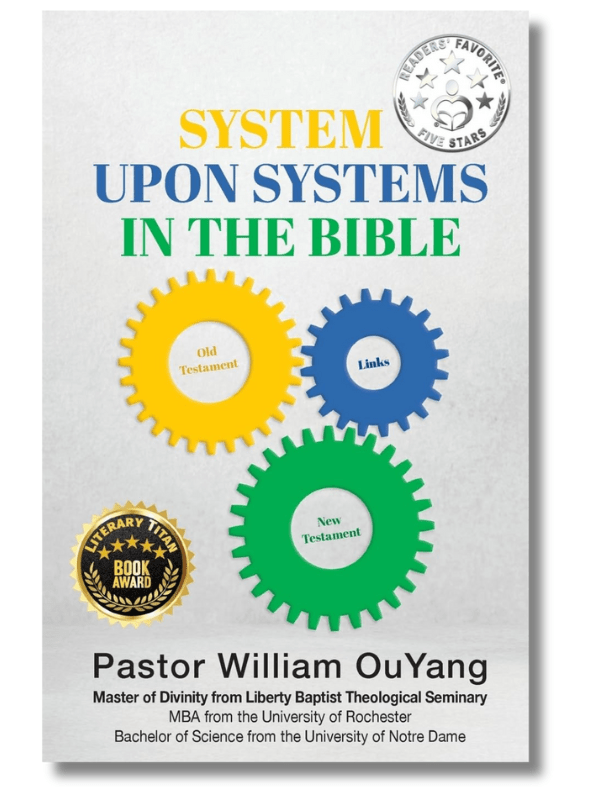System Upon Systems In the Bible
by Pastor William OuYang
Genre: Nonfiction / Christian
ISBN: 9781662952579
Print Length: 206 pages
Reviewed by Lauren Hayataka
A valuable tool for exploring Christianity through the lens of both tradition and modern relevance
William OuYang’s System Upon Systems in the Bible is a thoughtful guidebook that offers an educated yet humble perspective on the interconnectedness of scripture.
Each of the nine chapters stands independently, addressing different overarching principles that reveal the depth and beauty of God’s Word. This book is well-suited for religious individuals who are active within their faith, with many chapters providing outlines for Sunday school or small group discussions.
Holding a Master of Divinity from Liberty University, OuYang explores themes rooted in duality in System Upon Systems in the Bible. His academic background provides a solid foundation for his suggestion that we view duality not as opposing forces but as complementary elements working in tandem. He applies this perspective to topics such as human rights (from both societal and religious perspectives), the equality of men and women, free will and obedience, salvation and damnation, and the formation of the Holy Trinity. In the book’s second half, OuYang delves deeply into the nature of God, examining both the Holy Side and the Loving Side of God and how each side is demonstrated in the Old and New Testaments.
OuYang often uses personal anecdotes to illustrate his points, bringing a down-to-earth authenticity to his teachings. In one section, OuYang parallels God’s displeasure with King Saul for offering physical sacrifices instead of obeying His will and his childhood belief that physical gifts were the best way to show love to his mother when it was his obedience that mattered most. While this example may seem severe, OuYang balances it with a relaxed, even chatty, tone that makes even heavy topics accessible and engaging.
The book’s greatest strength is its accessibility, which sets it apart from others within the genre. OuYang achieves this through his engaging writing style and by incorporating graphics and tables that further clarify the topics and their nuances with a heavy reliance on scripture. The chapters that include outlines for group discussions are particularly valuable, offering a mix of straightforward yes-no questions and thought-provoking prompts suitable for nearly every audience.
Further enhancing the book’s accessibility is OuYang’s practical appeal to Christians who are actively involved in their church. He demonstrates a strong understanding of the structure of the modern church and the challenges that can arise from conflicts between members, including its leaders. He addresses issues such as the difficulties of being a youth pastor to privileged children and the stigma associated with volunteering for tasks like cleaning the church. The topics OuYang discusses are relevant to those deeply involved in church activities and believers who may not be as actively engaged.
The book does have its limitations too. Without citation, some of OuYang’s claims, especially those involving statistics or anecdotal evidence, can make readers question their validity. Other, more casual readers may also feel that topics like the political landscape surrounding Palestine and the fated election of Donald Trump appear out of place and more provocative than the rest of the book. That said, for many, especially those who see religion and politics as intertwined, these elements may add a layer of relevance and urgency to the text.
Despite these issues, OuYang’s System Upon Systems in the Bible remains valuable for those looking to deepen their understanding of biblical themes. Its blend of practical insights and theological reflections makes it particularly well-suited for believers aiming to enrich their faith in a group setting. Ultimately, OuYang’s thoughtful exploration of scripture offers a unique and accessible guide for Christians who seek to grow spiritually.
Thank you for reading Lauren Hayataka’s book review of System Upon Systems In the Bible by Pastor William OuYangl! If you liked what you read, please spend some more time with us at the links below.
The post Book Review: System Upon Systems in the Bible appeared first on Independent Book Review.
